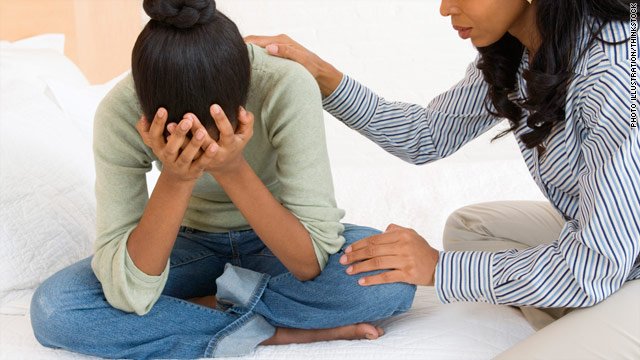
Researchers: African-Americans most likely to use physical punishment
A
switch, a belt, a shoe, a hand. Paddling, whipping, whupping, spanking. The
instruments and language of corporal punishment vary, but what connects them is
how often they are employed as parenting tools.
Researchers
who study corporal punishment say that parents of all ethnic groups,
socioeconomic categories and education levels practice some form of physical
punishment with their children.
“The
majority of parents across all ethnic groups spank at some point,” said
Elizabeth Gershoff, a professor and researcher on corporal punishment at the
University of Texas at Austin.
But
among the groups most likely to use it: African-Americans.
In
a study Gershoff co-authored that examined 20,000 kindergartners and their
parents, she found that 89% of black parents, 79% of white parents, 80% of
Hispanic parents and 73% of Asian parents said they have spanked their
children.
But
why do so many black parents approve of disciplining their children that way?
The answer is complicated, experts said.
Some
researchers have suggested it's a legacy left by the brutality of slavery. Some
say it's rooted in fear - that if parents don’t use force to demand obedience,
someone else will. Others said African-American parents, in aggregate, are
disproportionately lower-income, have less education and are more likely to
follow a religion that implores them not to spare the rod for fear of spoiling
the child - all factors that correlate with use of corporal punishment,
regardless of race.
Numerous
studies have pointed to negative consequences for all children who are spanked,
regardless of parents' race, ethnicity, income-level or education level. Kids
who are physically punished face higher risk of anxiety and depression, higher
rates of aggression toward others and a more distant relationship with their
parent, Gershoff said. Those risks are in addition to the risk of injury from
parents who cross the line from a hard smack on a behind - still damaging, researchers said – to abuse that leaves children bruised or
bleeding.
Dr.
Alvin F. Poussaint, a Harvard Medical School psychiatrist who has studied
mental health issues and parenting in African-American communities, is a
leading voice against corporal punishment. It’s an uphill battle.
“It’s
culturally embedded in America that spanking is a legitimate and good way to
discipline children. But the fact is, nearly all studies, except for a few, say
it is not a good way of disciplining and can actually produce damage,”
Poussaint said. “We have such damage in the black community, when you add to
that parents beating their kids, it’s sending the message that violence is an
OK way to solve problems.”
Nevertheless,
Poussaint said, questioning corporal punishment can provoke a defensive or
angry reaction from parents.
“Usually
some people stand up and say, ‘Well, I was beaten as a kid and I turned out
pretty well.’ Well, did they?” Poussaint said. “If you dig more deeply, you
don’t really know that… beating may have left scars in them that they don’t
really understand.”
Poussaint
dismisses the biblical imperative so often used as a justification for corporal
punishment as “a tired excuse.”
“Violence
begets violence, anger begets anger, and the loss of control makes it all
worse,” he said.
There
are researchers, community leaders and parents that are trying to change
attitudes toward spanking and corporal punishment among African-Americans.
The
Harlem Children’s Zone, a nonprofit community organization that provides
education and social services to a 100-block area in New York City, is working
to convince parents that corporal punishment isn't the answer. It spends two
sessions of its Baby College program for parents of children ages zero to 3
talking about how physical punishment is harmful and why it shouldn’t be used. Since
the nine-week Baby College began classes in 2001, more than 3,600 parents have
graduated.
“Sometimes
there is some pushback during those sessions, sometimes they go home and are
told by older relatives that they’re spoiling the child,” said Marty Lipp, an
Harlem Children's Zone spokesman. “We have to equip them to be able to make the
case to themselves and possibly to their relatives and neighbors.”
Asadah
Kirkland, an African-American mother and educator in Brooklyn, was inspired to
write her anti-spanking book, “Beating Black Kids,” after a friend said
“something about how you just need to beat kids sometimes.” The book includes
adults discussing how spanking affected them, and also offers parents
alternative methods of discipline.
Kirkland
now gives workshops encouraging parents not to use corporal punishment, and she
often encounters resistance from parents who believe it’s necessary. They
passionately defend their right to raise their children as their parents raised
them – with switch in hand.
“They
don’t want to be incriminated, they don’t want to incriminate their
parents,” Kirkland said. “They need to
validate what’s happened to them.”
Kirkland
said more parents must realize that parents need to use discipline in a way
that gives kids skills for handling conflict in the future: negotiation,
respect of authority and courage.
“Whatever
you want your future to look like, that’s what you need to be rearing and
creating in your children’s future,” Kirkland said. “These are the people who
are going to run the future, and if they’re coming up beaten up and resentful,
that’s the way they’re going to be when they grow up.”
Posted by
No comments:
Post a Comment